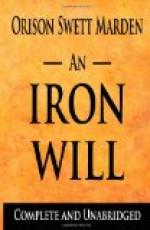Thurlow Weed, who was a journalist for fifty-seven years, strong, sensible, genial, tactful, and of magnificent physique, who did so much to shape public policy in the Empire State, tells a most romantic story of his boyhood:—
“I cannot ascertain how much schooling I got at Catskill, probably less than a year, certainly not a year and a half, and this was when I was not more than five or six years old. I felt a necessity, at an early age, of trying to do something for my own support.
“My first employment was in sugar-making, an occupation to which I became much attached. I now look with great pleasure upon the days and nights passed in the sap-bush. The want of shoes (which, as the snow was deep, was no small privation) was the only drawback upon my happiness. I used, however, to tie pieces of an old rag carpet around my feet, and got along pretty well, chopping wood and gathering up sap. But when the spring advanced, and bare ground appeared in spots, I threw off the old carpet encumbrance and did my work barefoot.
“There is much leisure time for boys who are making maple sugar. I devoted this time to reading, when I could obtain books; but the farmers of that period had few or no books, save their Bibles. I borrowed books whenever and wherever I could.
“I heard that a neighbor, three miles off, had borrowed from a still more distant neighbor a book of great interest. I started off, barefoot, in the snow, to obtain the treasure. There were spots of bare ground, upon which I would stop to warm my feet. And there were also, along the road, occasional lengths of log-fence from which the snow had melted, and upon which it was a luxury to walk. The book was at home, and the good people consented, upon my promise that it should be neither torn nor soiled, to lend it to me. In returning with the prize, I was too happy to think of the snow or my naked feet.
“Candles were then among the luxuries, not the necessaries, of life. If boys, instead of going to bed after dark, wanted to read, they supplied themselves with pine knots, by the light of which, in a horizontal position, they pursued their studies. In this manner, with my body in the sugar-house, and my head out of doors, where the fat pine was blazing, I read with intense interest the book I had borrowed, a ‘History of the French Revolution.’”
Weed’s next earning was in an iron foundry at Onondaga:
“My business was, after a casting, to temper and prepare the molding ‘dogs,’ myself. This was night and day work. We ate salt pork and rye and Indian bread, three times a day, and slept on straw in bunks. I liked the excitement of a furnace life.”
When he went to the “Albany Argus” to learn the printing business he worked from five in the morning till nine at night.
FROM HUMBLEST BEGINNINGS.
The more difficulties one has to encounter, within and without, the more significant and the higher in inspiration his life will be.—Horace Bushnell.




